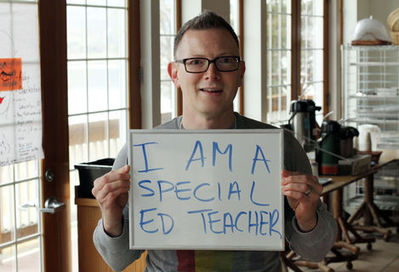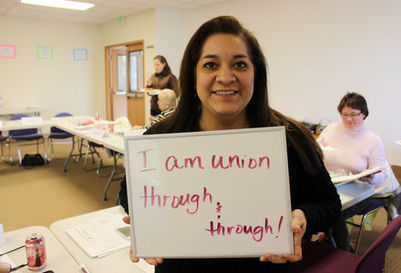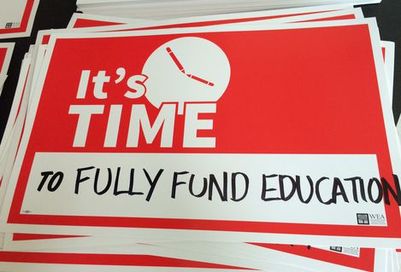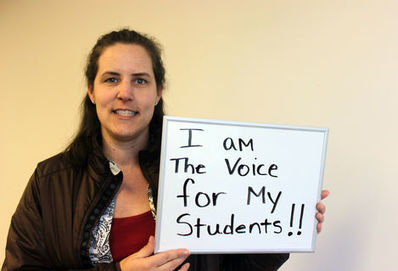Frequently Asked Questions

Membership 101
What does the acronym "WEA" mean?
WEA means the Washington Education Association. With over 90,000 of us, WEA is the largest union in Washington!
Specifically, which educators are part of the WEA family?
WEA includes so many exciting hero educators! Here's a list of what WEA members do:
I've heard the words "local" and "council". What's the difference?
Our local, SVEA, is our locally-based union of educators that are together in SVSD, in the same bargaining unit. Sometimes all educators in the school district are in the same local (Northshore Education Association), whereas in other locals it may just represent certificated educators (Snoqualmie Valley Education Association). It varies! A council is a WEA grouping of locals by geographical region. There are 21 councils, all of unique sizes, ranging from 1 local to over 50 locals! SVEA belongs to the Sammamish UniServ Council along with locals in Bellevue, Issaquah, Lake Washington (ESPs only), Mercer Island, Riverview, and Tahoma.
Is anyone forced to be part of the union?
No. "Closed shops" have been illegal since 1947. No one can be forced to join a union. Actually, nearly 100% of educators in Washington choose to join because we want to have our voices heard, understand the importance of a collectively bargained contract, and realize the strength in teaming together to assure the best public education for all of our students. It's pretty simple; we are stronger when we band together.
If someone asks me "why should I join the union?", what should I say?
Everyone's answer will be unique and personal. WEA has cited that organizing, bargaining, political action, and membership are all extremely important reasons to be a proud union member. Here's a member's response: "I belong to WEA and SVEA because our union helps me stand up for equity, our students' needs like curriculum and class size, and bargain a contract. Without our union and our collective bargained agreement, the district and legislature would have even more overcrowded classes, more testing, fewer books, and pay us even less. Together we have influence our schools to be the best for all kids and educators."
What does the acronym "WEA" mean?
WEA means the Washington Education Association. With over 90,000 of us, WEA is the largest union in Washington!
Specifically, which educators are part of the WEA family?
WEA includes so many exciting hero educators! Here's a list of what WEA members do:
- Teachers and Educational Staff Associates (librarians, counselors, nurses, OTs, etc.)
- Education Support Professionals (ESPs) (secretaries, para-educators, bus drivers, custodians, nutrition services workers, etc.)
- Substitutes
- Higher Education Faculty
- WEA-Retired
- Student WEA
I've heard the words "local" and "council". What's the difference?
Our local, SVEA, is our locally-based union of educators that are together in SVSD, in the same bargaining unit. Sometimes all educators in the school district are in the same local (Northshore Education Association), whereas in other locals it may just represent certificated educators (Snoqualmie Valley Education Association). It varies! A council is a WEA grouping of locals by geographical region. There are 21 councils, all of unique sizes, ranging from 1 local to over 50 locals! SVEA belongs to the Sammamish UniServ Council along with locals in Bellevue, Issaquah, Lake Washington (ESPs only), Mercer Island, Riverview, and Tahoma.
Is anyone forced to be part of the union?
No. "Closed shops" have been illegal since 1947. No one can be forced to join a union. Actually, nearly 100% of educators in Washington choose to join because we want to have our voices heard, understand the importance of a collectively bargained contract, and realize the strength in teaming together to assure the best public education for all of our students. It's pretty simple; we are stronger when we band together.
If someone asks me "why should I join the union?", what should I say?
Everyone's answer will be unique and personal. WEA has cited that organizing, bargaining, political action, and membership are all extremely important reasons to be a proud union member. Here's a member's response: "I belong to WEA and SVEA because our union helps me stand up for equity, our students' needs like curriculum and class size, and bargain a contract. Without our union and our collective bargained agreement, the district and legislature would have even more overcrowded classes, more testing, fewer books, and pay us even less. Together we have influence our schools to be the best for all kids and educators."

What We Do
How do I know what is happening in our union?
Lots of ways! The best way is through your building level meetings, and monthly Association meetings (ask your building rep about that). Consider being a building rep! Other ways include: Our local's website (sveaunion.org), WEA's website (washingtonea.org), WEA-PAC's website (ourvoicewashington.org), The WEA 2.0 quarterly newsletter (in print and online), email updates (sign up here), Facebook, and Twitter.
What are two professional development opportunities provided by WEA?
WEA provides PD for thousands of members every year! WEA's professional development options include: Social Justice through the Human and Civil Rights Department, Teacher certification and licensure (including ProTeach and National Boards) State Learning Standards (Common Core, STEM, etc.), Advocacy and Organizing (including "Summer U"), Special Education, Closing the Achievement and Opportunity Gaps, and Teacher Evaluation. For more info, go to: washingtonea.org/trainings.
In movies I see unions striking all the time. Is that accurate?
Not really. Most of the work of the association is not strike-related and strikes in our locals are actually extremely rare. They are the very last resort after all bargaining efforts between member-led bargain teams and the district are not successful. Strikes occasionally happen though, and in 2015, 4 out of 360 WEA locals walked the picket line (Seattle, Pasco, Kelso, and South Whidbey).
Some of my students come to school with no jackets or basic needs. Does WEA offer any help?
YES. Poverty and emergencies happen to many of our students and their families in Washington. The WEA Children's fund is a charity that reimburses members for students' urgent and immediate needs, like winter coats and more. Many members contribute to this fund. For information on the WEA Children's Fund: washingtonea.org/childrensfund.
Who is "the boss" and has the final say in WEA?
The supreme decision making body in the WEA is the Representative Assembly. In other words, THE MEMBERS! Every April, approximately 1,200 WEA members are elected by their peers and come together to direct the policy for the coming year (WEA-RA). Every three years at the RA, these nominated members also vote for our WEA President, Vice President and other board positions. Also, the annual NEA-RA that is the largest functioning direct democracy in the world! Ask your building rep about running for a seat!
How do I know what is happening in our union?
Lots of ways! The best way is through your building level meetings, and monthly Association meetings (ask your building rep about that). Consider being a building rep! Other ways include: Our local's website (sveaunion.org), WEA's website (washingtonea.org), WEA-PAC's website (ourvoicewashington.org), The WEA 2.0 quarterly newsletter (in print and online), email updates (sign up here), Facebook, and Twitter.
What are two professional development opportunities provided by WEA?
WEA provides PD for thousands of members every year! WEA's professional development options include: Social Justice through the Human and Civil Rights Department, Teacher certification and licensure (including ProTeach and National Boards) State Learning Standards (Common Core, STEM, etc.), Advocacy and Organizing (including "Summer U"), Special Education, Closing the Achievement and Opportunity Gaps, and Teacher Evaluation. For more info, go to: washingtonea.org/trainings.
In movies I see unions striking all the time. Is that accurate?
Not really. Most of the work of the association is not strike-related and strikes in our locals are actually extremely rare. They are the very last resort after all bargaining efforts between member-led bargain teams and the district are not successful. Strikes occasionally happen though, and in 2015, 4 out of 360 WEA locals walked the picket line (Seattle, Pasco, Kelso, and South Whidbey).
Some of my students come to school with no jackets or basic needs. Does WEA offer any help?
YES. Poverty and emergencies happen to many of our students and their families in Washington. The WEA Children's fund is a charity that reimburses members for students' urgent and immediate needs, like winter coats and more. Many members contribute to this fund. For information on the WEA Children's Fund: washingtonea.org/childrensfund.
Who is "the boss" and has the final say in WEA?
The supreme decision making body in the WEA is the Representative Assembly. In other words, THE MEMBERS! Every April, approximately 1,200 WEA members are elected by their peers and come together to direct the policy for the coming year (WEA-RA). Every three years at the RA, these nominated members also vote for our WEA President, Vice President and other board positions. Also, the annual NEA-RA that is the largest functioning direct democracy in the world! Ask your building rep about running for a seat!

Issues educators face:
In our schools, our classes are overcrowded. What are we doing about it?
Appropriate class size is part of a basic education, and this was confirmed in the 2012 McCleary Supreme Court decision. To ensure the legislature stopped ignoring class size, in 2014 WEA-RA members voted to support Initiative 1351. Members collected over 350,000 signatures, ensured it was on the ballot, and campaigned to pass it! Currently K-3 classes are getting relief, and the legislature still has to make improvements for the rest of our students. Local bargaining teams are also working on negotiating better class sizes and caseloads. Here's more information from Class Size Counts: classsizecountswa.com.
There is way too much high stakes and standardized testing! Why do some legislators insist on even more tests and tying test scores to teacher evaluations?
WEA members have always advocated for responsible, teacher-approved assessment systems inside and outside of the classroom. WEA opposes the sole use of any single test in making high-stakes decisions about the quality of schools, evaluation of teachers, or student achievement. Many legislators (most of whom have never been educators) think that the testing will make educators better at their jobs, and/or make students smarter. For the last several years, WEA members have written, called, emailed and lobbied their legislators. Consequently, we have helped reject these nonsensical bills that would have tied test scores to teacher evaluations. You can also find more information about testing and opting out here: washingtonea.org/testing.
Why are some people so opposed to unions?
Our union is extremely valuable to us. SVEA and WEA and fight for educators, bargain fair contracts, provide professional development, influence the politics of education, and more. Unions make public education a better place for students, families, educators, and the community. The United Nations also recognizes workers' ability to form a union as a basic human right. Unfortunately, many organizations (like the Freedom Foundation in WA and the Koch Brothers, etc.) seek to dismantle unions, and public sector unions more specifically. They are misguided claims, but our opponents often say that unions make workers lazier, add needless bureaucracy, force people into them, and make the workplace more inefficient. A recent US Supreme Court case called Friedrichs v. CTA proposed to make "agency fee" illegal. This would have challenged how educators currently pay their fair share of union dues to cover collective bargaining (the non-political costs). Despite these threats, educators and public sector union members are standing strong knowing that unions benefit all.
I need to renew my certificate. What do I do?
By law, each educator is responsible to renew their own certificates. The good news is that the WEA provides lots of help! Our Professional Development network holds top-notch trainings for National Boards. And YES - WEA offers clock hours! For more information go to: washingtonea.org/my-certification.
What does right-to-work mean?
"Right-to-work...for less" would be a more accurate phrase. Currently, 28 states (not WA) are right to work, and the list is growing. Right-to-work laws prevent unions from collecting dues from all members of that bargaining unit. Instead of everyone paying their fair share of the costs of negotiating contracts, people can opt-out, be free riders, and depending on the state can enjoy the benefits without paying a cent. In right to work states, educators often have less labor rights, less pay, and less benefits.
In our schools, our classes are overcrowded. What are we doing about it?
Appropriate class size is part of a basic education, and this was confirmed in the 2012 McCleary Supreme Court decision. To ensure the legislature stopped ignoring class size, in 2014 WEA-RA members voted to support Initiative 1351. Members collected over 350,000 signatures, ensured it was on the ballot, and campaigned to pass it! Currently K-3 classes are getting relief, and the legislature still has to make improvements for the rest of our students. Local bargaining teams are also working on negotiating better class sizes and caseloads. Here's more information from Class Size Counts: classsizecountswa.com.
There is way too much high stakes and standardized testing! Why do some legislators insist on even more tests and tying test scores to teacher evaluations?
WEA members have always advocated for responsible, teacher-approved assessment systems inside and outside of the classroom. WEA opposes the sole use of any single test in making high-stakes decisions about the quality of schools, evaluation of teachers, or student achievement. Many legislators (most of whom have never been educators) think that the testing will make educators better at their jobs, and/or make students smarter. For the last several years, WEA members have written, called, emailed and lobbied their legislators. Consequently, we have helped reject these nonsensical bills that would have tied test scores to teacher evaluations. You can also find more information about testing and opting out here: washingtonea.org/testing.
Why are some people so opposed to unions?
Our union is extremely valuable to us. SVEA and WEA and fight for educators, bargain fair contracts, provide professional development, influence the politics of education, and more. Unions make public education a better place for students, families, educators, and the community. The United Nations also recognizes workers' ability to form a union as a basic human right. Unfortunately, many organizations (like the Freedom Foundation in WA and the Koch Brothers, etc.) seek to dismantle unions, and public sector unions more specifically. They are misguided claims, but our opponents often say that unions make workers lazier, add needless bureaucracy, force people into them, and make the workplace more inefficient. A recent US Supreme Court case called Friedrichs v. CTA proposed to make "agency fee" illegal. This would have challenged how educators currently pay their fair share of union dues to cover collective bargaining (the non-political costs). Despite these threats, educators and public sector union members are standing strong knowing that unions benefit all.
I need to renew my certificate. What do I do?
By law, each educator is responsible to renew their own certificates. The good news is that the WEA provides lots of help! Our Professional Development network holds top-notch trainings for National Boards. And YES - WEA offers clock hours! For more information go to: washingtonea.org/my-certification.
What does right-to-work mean?
"Right-to-work...for less" would be a more accurate phrase. Currently, 28 states (not WA) are right to work, and the list is growing. Right-to-work laws prevent unions from collecting dues from all members of that bargaining unit. Instead of everyone paying their fair share of the costs of negotiating contracts, people can opt-out, be free riders, and depending on the state can enjoy the benefits without paying a cent. In right to work states, educators often have less labor rights, less pay, and less benefits.

WEA-PAC Power
What is WEA-PAC?
WEA-PAC is the political action committee for WEA members. WEA-PAC is non-partisan and, in a democratic process, it first interviews and then supports pro-education candidates at the local and state-wide levels. WEA-PAC can also assist pro-education initiatives and legislation. Dues are $2.25 per month and over 30,000 of us are proud WEA-PAC members. The more of us there are, the more powerful our voice - educators are the experts of education and our voices must be included!
Who makes the public education laws in Washington state?
The legislature. Most of politics and money of education is conducted at the state level, but some comes from local and federal levels too.
How does WEA-PAC decide which candidates to support?
Each Uniserv Council (and some locals) have WEA-PAC members who interview candidates and endorse ones who are pro-education. Our WEA-PAC member peers interview endorse candidates at all of these levels of office, plus others (the Superintendent of OSPI, the state attorney general, many county and even local races). Educators ask candidates specific questions about how they will best serve the students and educators in their communities. WEA-PAC endorsements are always non-partisan. Candidates are often eager to receive a WEA-PAC endorsement.
I just want to teach, not worry about politics. Why are politics important to public education?
Since public education is the law and paid for with public money, it is inherently political. Even though the elected officials are probably not educators, they make laws and decisions that affect every aspect of our student and educator lives: class size, curriculum, testing, funding, educator certification, pay, benefits, and more. Our voice must be included in the decision-making process because we know what is best for our students who we work with every single day. For updates check out washingtonea.org/ourvoice.
How many WEA members are part of WEA-PAC?
Approximately 40% of members across the state have joined WEA-PAC to have their voices heard in education policy decision making. Our WEA-PAC goal is 50% plus one (for a majority), however we are excited to have many locals at or near 100%. WEA-PAC has grown enormously in the last 15 years. For more information, check out: washingtonea.org/join-wea-pac.
What is WEA-PAC?
WEA-PAC is the political action committee for WEA members. WEA-PAC is non-partisan and, in a democratic process, it first interviews and then supports pro-education candidates at the local and state-wide levels. WEA-PAC can also assist pro-education initiatives and legislation. Dues are $2.25 per month and over 30,000 of us are proud WEA-PAC members. The more of us there are, the more powerful our voice - educators are the experts of education and our voices must be included!
Who makes the public education laws in Washington state?
The legislature. Most of politics and money of education is conducted at the state level, but some comes from local and federal levels too.
How does WEA-PAC decide which candidates to support?
Each Uniserv Council (and some locals) have WEA-PAC members who interview candidates and endorse ones who are pro-education. Our WEA-PAC member peers interview endorse candidates at all of these levels of office, plus others (the Superintendent of OSPI, the state attorney general, many county and even local races). Educators ask candidates specific questions about how they will best serve the students and educators in their communities. WEA-PAC endorsements are always non-partisan. Candidates are often eager to receive a WEA-PAC endorsement.
I just want to teach, not worry about politics. Why are politics important to public education?
Since public education is the law and paid for with public money, it is inherently political. Even though the elected officials are probably not educators, they make laws and decisions that affect every aspect of our student and educator lives: class size, curriculum, testing, funding, educator certification, pay, benefits, and more. Our voice must be included in the decision-making process because we know what is best for our students who we work with every single day. For updates check out washingtonea.org/ourvoice.
How many WEA members are part of WEA-PAC?
Approximately 40% of members across the state have joined WEA-PAC to have their voices heard in education policy decision making. Our WEA-PAC goal is 50% plus one (for a majority), however we are excited to have many locals at or near 100%. WEA-PAC has grown enormously in the last 15 years. For more information, check out: washingtonea.org/join-wea-pac.

Big Wins
In 2015, educators walked-out all over the state. It was all over the news. What was that all about?
In the spring of 2015, all across the state, over 40,000 WEA members took a stand against the legislature for not adequately funding education. Communities, students, and educators came together during these "rolling walk-outs" to bring attention to this struggle. Our state Supreme Court demanded that the legislature invest in our kids as is spelled out in our constitution, and they did not do it. These walk-outs made national news! It is true that the legislature allocated some money into education, but it is still far from "ample" as our constitution strictly requires. Olympia has until the 2017-18 school year to fully fund education, and they are still far behind. Since the end of the third special legislative sessions in July, the state Supreme Court has fined the legislature $100,000 a day for not complying. It is an outrage, and is still a white-hot topic in state politics.
What is a COLA?
A COLA is a guaranteed cost-of-living increase. In 2000, WEA educators collected signatures and voted for I-732 to ensure school employees received cost-of-living adjustments (or COLA) just like firefighters, police and other public servants. 63% of all voters approved this measure! Sadly, this has been a struggle as this COLA has been "suspended" by the legislature time and time again (six times in a row until 2015).
When was WEA founded?
The Washington Education Association was formed in 1889, the same year that Washington became a state. There were 124 WEA members, consisting of teachers and school administrators in 1889. Through coalition building, and hard fought laws, by 1965 WEA had grown to 34,000 members, and today WEA represents over 90,000 members!
What's the McCleary decision and what role did WEA play?
In 2004, WEA-RA delegates voted to pay a "special assessment" of an extra $1.00 per month for two years to help fund the lawsuit that had been filed by the McCleary family. This lawsuit basically said that the state needed to uphold its "paramount duty" to "amply" fund public education for all students. The Washington Supreme Court agreed with the McCleary family, and today the state is under a contempt order to fully fund education by the 2017-18 year.
In 2015, the Washington Supreme Court ruled that Charter schools are unconstitutional. What was their reasoning for this decision?
Charter schools are unconstitutional because they cost taxpayer public education money, but are not governed by elected boards, and therefore not accountable to voters. Charter schools also exclude students, while public schools educate ALL students. Across the country, without being accountable to the public, Charter schools egregious problems. If you're interested, look at what has happened in Louisiana, Nashville, Washington DC and Pennsylvania. Already in Washington there are options outside public schools in the forms of homeschooling and private schools. But when public money is used, following the rules and public oversight is and should be the law. Public funds for public schools is what our Supreme Court has ruled.
In 2015, educators walked-out all over the state. It was all over the news. What was that all about?
In the spring of 2015, all across the state, over 40,000 WEA members took a stand against the legislature for not adequately funding education. Communities, students, and educators came together during these "rolling walk-outs" to bring attention to this struggle. Our state Supreme Court demanded that the legislature invest in our kids as is spelled out in our constitution, and they did not do it. These walk-outs made national news! It is true that the legislature allocated some money into education, but it is still far from "ample" as our constitution strictly requires. Olympia has until the 2017-18 school year to fully fund education, and they are still far behind. Since the end of the third special legislative sessions in July, the state Supreme Court has fined the legislature $100,000 a day for not complying. It is an outrage, and is still a white-hot topic in state politics.
What is a COLA?
A COLA is a guaranteed cost-of-living increase. In 2000, WEA educators collected signatures and voted for I-732 to ensure school employees received cost-of-living adjustments (or COLA) just like firefighters, police and other public servants. 63% of all voters approved this measure! Sadly, this has been a struggle as this COLA has been "suspended" by the legislature time and time again (six times in a row until 2015).
When was WEA founded?
The Washington Education Association was formed in 1889, the same year that Washington became a state. There were 124 WEA members, consisting of teachers and school administrators in 1889. Through coalition building, and hard fought laws, by 1965 WEA had grown to 34,000 members, and today WEA represents over 90,000 members!
What's the McCleary decision and what role did WEA play?
In 2004, WEA-RA delegates voted to pay a "special assessment" of an extra $1.00 per month for two years to help fund the lawsuit that had been filed by the McCleary family. This lawsuit basically said that the state needed to uphold its "paramount duty" to "amply" fund public education for all students. The Washington Supreme Court agreed with the McCleary family, and today the state is under a contempt order to fully fund education by the 2017-18 year.
In 2015, the Washington Supreme Court ruled that Charter schools are unconstitutional. What was their reasoning for this decision?
Charter schools are unconstitutional because they cost taxpayer public education money, but are not governed by elected boards, and therefore not accountable to voters. Charter schools also exclude students, while public schools educate ALL students. Across the country, without being accountable to the public, Charter schools egregious problems. If you're interested, look at what has happened in Louisiana, Nashville, Washington DC and Pennsylvania. Already in Washington there are options outside public schools in the forms of homeschooling and private schools. But when public money is used, following the rules and public oversight is and should be the law. Public funds for public schools is what our Supreme Court has ruled.
